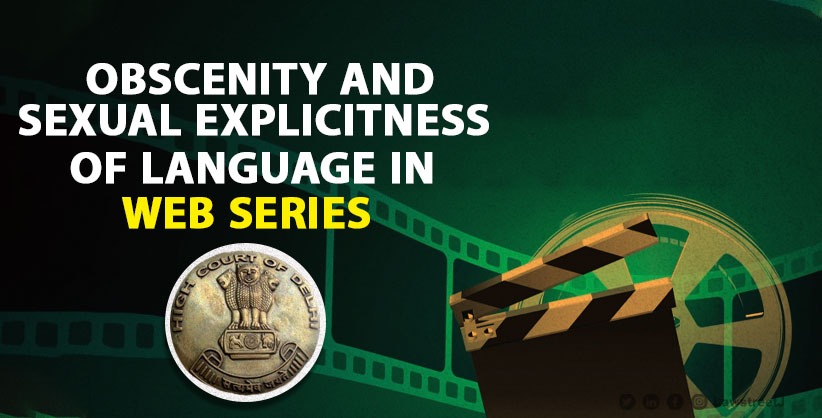NEW DELHI: The Delhi High Court has on Monday asked the Union government to consider framing laws or rules for enforcing stricter application of Information Technology Rules, 2021 for the intermediaries, while stressing the need to tighten regulations on the language used in web series streamed on OTT (over the top) platforms.
Justice Swarna Kanta Sharma said the challenge faced by our country, as by many other countries, for enacting appropriate law, guidelines and rules to regulate the content on social media and on OTT platforms needs urgent attention.
The court upheld a direction to register an FIR against TVF Media Labs and actors of its web series 'College Romance' under Section 67A (punishment for publishing or transmitting of material containing sexually explicit act in electronic form) and Section 67 (punishment for publishing or transmitting obscene material in electronic form) of the Information Technology Act, 2000.
It, however, dropped charges of obscenity and its circulation under the Indian Penal Code (IPC).
This court draws the attention of the Ministry of Information and Technology to the situations which are fast emerging on a daily basis and to take steps for enforcing stricter application of its rules qua the intermediaries as notified in Information Technology (Intermediary Guidelines and Digital Media Ethics Code) Rules, 2021 and make any laws or rules as deemed appropriate in its wisdom, in light of the observations made in this judgment, the court said.
The court directed that a copy of the judgment be forwarded to the secretary, ministry of electronics and information technology, Government of India, and the officials concerned at YouTube India after noting that the use of vulgar language in public domain and social media platforms which are open to children of tender age needs to be taken seriously.
"Majority of this country cannot be said to be using such vulgar, profane, indecent, swear words and expletives as projected in the web series in question in day-to-day spoken language with each other even in educational institutions, the court said.
The individualistic choice which is not the choice of the majority of people of this country cannot be portrayed as choice of that majority and to be broadcasted on the ground or assumption that youth of this country speak such foul or profane language, the court said.
In its 41-page judgment, the court said it will be a sad day for society in case the same vulgar and obscene language is spoken in schools, streets and houses in the name of new culture of the students.
"The power of obscenity and sexual explicitness of language used in this web series therefore, cannot be undermined and it has a definite effect of depraving and corrupting the minds of people, especially the impressionable minds and will require to be confined and subjected to Article 19(2) of the Constitution of India, and at the same time for transmitting such content, the petitioners will be liable to face action under Section 67 and 67A of IT Act," the bench said.
It pointed out the University of Delhi has its own glorious history, majesty, respect and heritage. The college students cannot be said to be using the language used in this web series since the limits of decency, civilised behavior and civilised language are recognized and still cared and valued by the new generation. Just because a few people may be using such language, they cannot be allowed to corrupt the minds which are impressionable and be told that this is "in-thing", "the new ok", or "new normal", language in the colleges.
In the present case, TVF Media Labs Pvt Ltd is involved in the creation of episodes of the web series College Romance. The said series is streamed on various platforms such as SonyLiv, YouTube, including TVF Play (an OTT Platform) which is owned by petitioner no 1. It is, therefore, clear that online content curator and intermediaries are also in clear violation of the above-mentioned guidelines as neither there was any classification nor any warning regarding the profanity of language or excessive use of expletives. The web series was available to every age group. Therefore, this web series also stood covered under violation of the Rules of 2021, the court said.
The court also pointed out that the web series does not mirror actual college life or society. Though the moral or linguistic choices as well as choice and freedom to watch any entertainment channel lies with every individual of this country, the foul language and swear words used in the web series cannot take shelter under the argument of the new generation using such language, it said.
The words and language used in this web series will certainly be found by many as naturally disgusting, dirty and sexual and these swear words and profanities certainly are not part of standard Hindi or any other Indian language. Though the social perceptions shape the popular culture, the linguistic history in relation to such swear and obscene words has long been considered a taboo or unworthy of being spoken in a social gathering. To uphold the contention of the petitioners that hurling such obscenities in public forums and by the young generation in general, in the universities and colleges, is so common that it is considered natural, without causing any distress, could amount to holding that a certain standard of decency cannot be expected on streets, public places or educational institutions, the court said.







